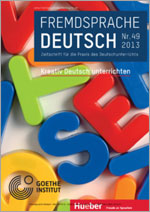Issue 1/2008 - ISSN 1470-9570
ARTICLES
Introduction: Cinema and Migration since Unification.
Joanne Leal, London, and Klaus-Dieter Rossade, Milton Keynes (pages 1-5)
Blurring or shifting boundaries? Concepts of culture in Turkish–German Migrant Cinema.
Guido Rings, Cambridge (pages 6-39)
This paper aims to explore the developments of different concepts of culture in Turkish–German Migrant Cinema before and after German Unification. Key questions addressed will be:
1. How do these films express cultural differences and to what extent does this representation follow traditional concepts of culture?
2. How is the interconnectedness of cultures articulated and how far does this relate to current notions of interculturalism and transculturalism?
3. Which are the key differences of former migrants’ cinematic representations in pre- and post-unified Germany?
Unlike common perceptions, this paper will argue that most films, including productions by celebrated directors such as Fatih Akın, continue to draw on traditional concepts of culture that break with the strong transcultural perspectives voiced by the same directors. While there is a development from rather separatist multicultural and intercultural representations in Turkish–German cinema before Unification towards more interconnected transcultural portrayals in post-Unification films, many contemporary productions maintain monocultural perspectives. All this seems to follow trends originating from German Cinema about migrants but there is also evidence that a traditional concept of ‘Kanaken’ culture developed in and disseminated via Migrant Literature and Cinema has made its way into German film.
Violence, sexuality and the family: identity ‘within and beyond Turkish-German parameters’ in Fatih Akın’s Gegen die Wand, Kutluğ Ataman’s Lola + Bilidikid and Anno Saul’s Kebab Connection.
Victoria Fincham, Nottingham (pages 40-72)
This essay investigates the interaction between violence, sexuality, gender and the role of the family in the construction of Turkish-German identities in Kutluğ Ataman’s Lola + Bilidikid (1999), Fatih Akın’s Gegen die Wand (2004) and Anno Saul’s Kebab Connection (2005). Rob Burns argues that Turkish-German cinema is moving away from themes of oppression with a specific focus on personal experience and is instead becoming more transnational in its content and less politically and socially engaged. Jim Jordan similarly claims that the ‘between two worlds’ paradigm, which has commonly been used to describe a sense on the part of Turkish-German Gastarbeiter and their offspring of being torn between the influences of their Turkish and German cultural spheres, has become outdated and unhelpful. However, through detailed narrative and character analyses I argue that the three films examined here indicate that the formation of a Turkish German identity appears to be a far more complicated process for the youngest generation of Turkish-Germans than it has been for their predecessors. I demonstrate that the ‘between two worlds’ paradigm can still be useful in defining the generational and familial conflicts affecting this generation and suggest that the continuing importance of specifically Turkish-German social issues shows that a move towards transnational filmic identities is only in its early stages.
Schreiben, Denken, Sprechen: in der Fremdsprache. Ein Neuansatz.
Karin E. Yeşilada, Munich (pages 73-99)
This article argues that with the emergence of a new generation of directors, screenwriters, actors and comedians, most of them Turkish born and having grown up in Germany, Turkish-German film has undergone a fundamental transformation throughout the last decade. Inspired by European migrant film productions, filmmakers like Fatih Akın have contributed to a new tone in Turkish-German cinema. Turkish comedy also forms a new genre which has spread over to German television, where Kaya Yanar has successfully established ethno-comedy. Furthermore, new TV-series, like Türkisch für Anfänger, blend the Turkish and the German together in an exploration of the experiences of a patchwork-family. Meanwhile, German public broadcasting channels try to demonstrate a degree of normalization in the area of migrant experience, presenting new, positive image of the integrated migrant on screen. This article takes a closer look at what might be described as Turkish-German screenpower.
Import and Export: Ulrich Seidl’s Indiscreet Anthropology of Migration.
Martin Brady, London, and Helen Hughes, Surrey (pages 100-122)
Austrian director Ulrich Seidl’s documentary and fiction films have received international recognition, and aroused considerable controversy, for their extreme subject matter (xenophobia, deprivation, physical and sexual violence) and for their inimitable style (obsessive symmetry and static tableaux). As a ‘Berufs-Oppositionskünstler’ who refuses to offer straightforward political solutions he has been compared to German directors Rainer Werner Fassbinder and Christoph Schlingensief and his compatriot Michael Haneke. This article examines three films by Seidl, spanning his career to date, which have the theme of migration as their subject: Good News (1990), a study of migrant newspaper vendors in Vienna, Mit Verlust ist zu rechnen (1992), a post-Wende documentary on a failed courtship across the Austrian-Czech border, and the feature film Import Export (2007), which tells the story of bi-directional migration between Austria and the Ukraine. Seidl’s ‘anthropology of migration’ is examined in the context of Jean Rouch’s cinéma-vérité, and his hyper-stylization is demonstrated to offer a unique way of looking both at contemporary migration and at migrants themselves. Shifts in the portrayal of borders since unification are examined, and Seidl’s unflinching camera is shown not only to ‘voyeurise the voyeurs’, but also to gaze severely yet democratically on transnational movements in the ‘new Europe’.
Das Hueber-Portal für DaF/DaZ-Kursleiter und –Lehrer bietet zahlreiche nützliche Online-Services für Ihren Unterricht: www.hueber.de/deutsch-als-fremdsprache
Besuchen Sie auch den Infoservice zu:
Fremdsprache Deutsch - Zeitschrift für die Praxis des Deutschunterrichts
Herausgegeben vom Hueber Verlag in Zusammenarbeit mit dem Goethe-Institut
www.hueber.de/fremdsprache-deutsch





